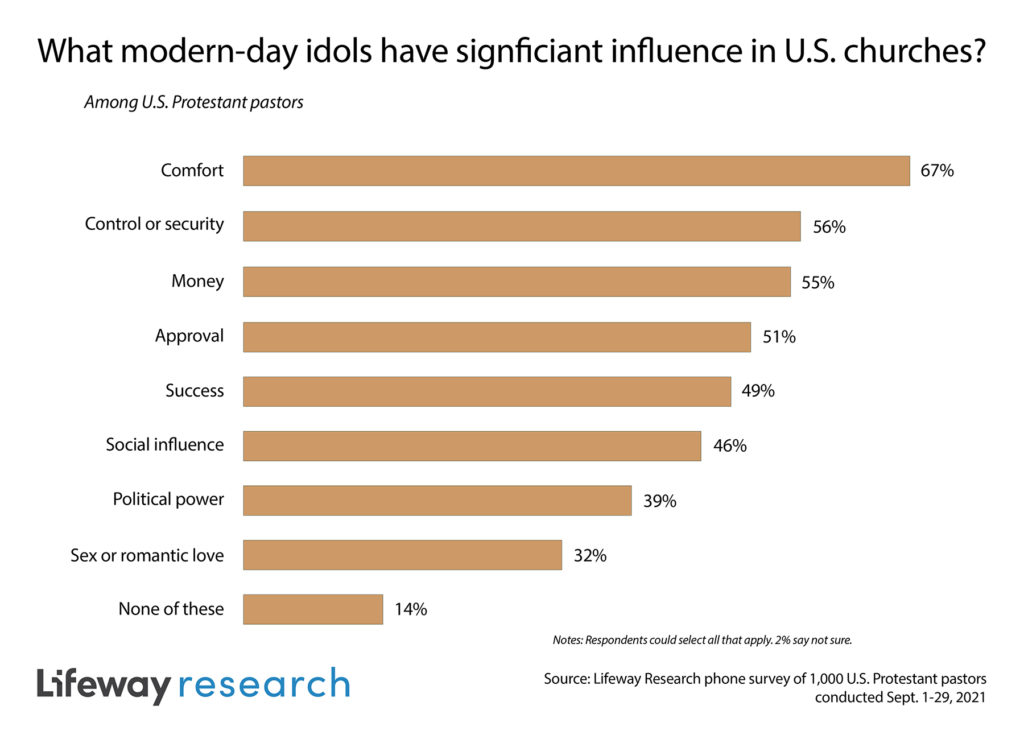Idols don’t always come in the form of carved statues or reside in places of worship. Many pastors believe modern-day idols can be benign-looking desires with significant influence on people in their congregations.
According to a study from Lifeway Research, more than half of U.S. Protestant pastors believe comfort (67%), control or security (56%), money (55%) and approval (51%) are idols that have significant influence on their congregations. When asked to choose the potential idol with the most sway over people in their churches, pastors again point to comfort (30%) and control or security (20%) above the others.
“It’s easy to think that those in Christian churches have chosen their God and are faithful to Him,” said Scott McConnell, executive director of Lifeway Research. “However, pastors quickly acknowledge how divided their congregations’ allegiances can be. These gods don’t have a physical shrine, but they compete for the hearts of Christians.”
Significant Influence of Idols
While most pastors point to comfort, security, money and approval as potential idols, fewer say success (49%) and social influence (46%) are idols in their congregations. Nearly 2 in 5 say political power (39%) is an idol their congregants face, and nearly 1 in 3 say sex or romantic love (32%). Another 14% of pastors say none of these are idols with influence in their churches, and 2% say they’re not sure.

Younger pastors are more likely than older pastors to identify several of these modern-day idols in their churches—particularly political power, money and control or security. Pastors ages 18-44 are the most likely to say political power (55%) and control or security (72%) are idols they see in their congregations.
The younger pastors are, the more likely they are to see money as a rival object of worship. Pastors ages 18-44 (63%) and 45-54 (58%) are more likely to say money is an idol in their churches than pastors 65 and older (46%).
Furthermore, older pastors are less likely to identify any of these potential idols among their congregants. Pastors ages 55-64 (18%) and over 64 (19%) are more likely to say none of these are idols in their churches than pastors 18-44 (9%) or 45-54 (10%).
“The large differences we see between younger and older pastors cannot be definitively explained by this study,” McConnell said. “There are signs that younger pastors are of the mindset that idols are rampant today, whereas older pastors may be slower to classify one of these as having significant influence on their people, or they may define idols more narrowly.”
Some different modern-day idols stood out to pastors of different ethnicities. White pastors are more likely than African American pastors to identify political power (41% v. 29%) and approval (53% v. 40%) as idols in their churches. And African American pastors are more likely than white pastors to say none of these are idols in their churches (25% v. 13%).
Pastors with higher levels of education are more likely than pastors with less formal education to identify money and control or security as idols in their churches. Pastors with master’s degrees (64%) or doctoral degrees (57%) are more likely than those with no college degree (43%) to say money is an idol in their churches. And pastors with master’s degrees (67%) or doctoral degrees (64%) are more likely than those with bachelor’s degrees (47%) or without college degrees (38%) to say control or security. Meanwhile, pastors with no college degree (25%) are the most likely to say none of these are modern-day idols in their churches.
Pastors of larger churches are more likely to identify idols of social influence and sex or romantic love in their congregations than pastors of smaller churches. Pastors of churches with more than 250 (55%) in attendance and those with 100-249 (51%) are more likely than those at churches with 50-99 (42%) or less than 50 (39%) to say social influence. Similarly, pastors at churches with attendance of more than 250 (40%) and 100-249 (39%) are more likely than those at churches with attendance of 50-99 (30%) or fewer than 50 (21%) to identify sex or romantic love as an idol.

